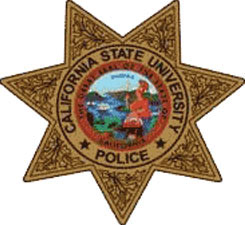Despite popular belief, officers don?t have quotas

police department logo::Sacramento State Police Department
March 24, 2010
Do police officers in the Sacramento State Police Department have quotas for the number of traffic tickets they have to write in a month?That is a question that police officers here on campus get asked quite a bit, probably because ticket quotas are an easy way to explain why police officers write traffic tickets. The question gets asked often enough that most police officers, regardless of their agency, probably know a joke or two about being rewarded with televisions, toasters and microwave ovens for tickets they write.
All kidding aside, though, the simple answer is that officers in the department don’t have ticket quotas.
A ticket quota means that police officers are told to write a certain number of traffic citations in a month, no matter how many citizens are committing traffic law violations. The Sacramento State Police Department does not have such a policy, either officially or unofficially.
However, all police officers take an oath to protect life, property and to uphold the law, whether they are police officers at the Sacramento State Police Department, a municipal agency, or a county sheriff’s department. Moreover, at the most basic level, a police officer’s job is to keep citizens safe.
Traffic enforcement qualifies on all of these counts, which is the primary reason officers conduct traffic enforcement stops. Statistics have shown that traffic enforcement prevents vehicle collisions, thereby reducing damage to both private and public property, and along with the reduction of traffic collisions comes a reduction in the number of injury collisions.
Enforcement of traffic laws does this by making people more attentive to their driving habits, due to the presence of a police officer in a marked patrol unit, regardless of whether the officer is directing traffic, engaged in a traffic enforcement stop, or simply driving on routine patrol. In most cases, the presence of an officer coupled with the mere possibility of a traffic enforcement stop, is usually enough to encourage a majority of citizens to obey traffic laws.
The types of traffic enforcement stops that police officers make can be categorized into two major types, moving and non-moving violations. Moving violations address driving behavior, such as speeding, stop sign, red light, lane usage and failure-to-yield violations. Non-moving violations deal primary with vehicle mechanical, identification and safety issues, such as vehicle lighting, license plate and registration display issues, loud stereo equipment and safety equipment violations. Generally speaking, non-moving violations require citizens to take some corrective action after a citation is issued, such as making a minor mechanical repair or updating their vehicle registration information with DMV.
One of the most common questions citizens have regarding traffic enforcement is what they need to do to resolve an outstanding traffic citation. Usually, what citizens needs to do depends upon the type of citation they were issued, as well as their past driving record. In some cases, the past driving record is also a factor in calculating the traffic citation fine amount, which is done by the traffic court. This is why police officers often cannot tell a citizen what the fine will be for a particular traffic offense, if the citizen asks.
Typically, though, when the citation is issued, the police officer will give the citizen a traffic court date, which will be listed along with the traffic court contact information at the bottom of the citation. If the citizen was cited for a correctable non-moving violation, it will be indicated on the citation, and the citizen will need to make the appropriate correction before the traffic court date.
Regardless of whether the citation was for a moving or non-moving violation, the traffic court will usually send a reminder notice to the citizen within two weeks of the citation being issued. The reminder notice will indicate the fine amount and detail the procedure for the citizen to register for traffic violator school (if eligible), and how to pay the fine by mail, as well as detail the procedure to request a court trial. It is also important to remember that if the citizen fails to respond to the court by mail, or fails to appear in court on or before the court date, the citizen could have his or her driving privileges suspended, and the court could issue a warrant for his or her arrest.
Basically, keeping people safe while they are driving home, driving to work and driving to school is the reason police officers perform traffic enforcement and write traffic citations. So, if you see a Sacramento State police officer engaged in a traffic stop, please remember that the officer isn’t trying to meet a quota of citations for the month … or win a new microwave oven. The officer is simply trying to make the daily commute a little bit safer for everyone.If you have a question for the police officers, dispatchers, and administrative staff members of the Sacramento State Police Department, email the question to [email protected], and your question may be answered in a future column.




























































































































